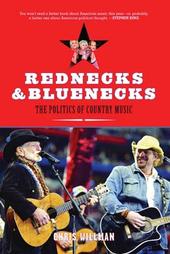NOW IN PAPERBACK!
Rednecks & Bluenecks: The Politics of Country Music is an acclaimed new book from Entertainment Weekly senior writer Chris Willman. He interviews artists from both the mainstream and alt-country worlds--ranging from the Dixie Chicks to Toby Keith, and from Tim McGraw to Drive-by Truckers to Merle, Willie and Kris--to get at what the music of America's heartland has to say about the state of the nation. Some endorsements and reviews:
STEPHEN KING, novelist:
"Chris Willman's Rednecks & Bluenecks is an entertaining and informative overview of the country music scene in the 21st century. It also proves conclusively that American country music is really American folk music: a mirror of interesting (and troubled) times. You won't read a better book about American music this year--or, probably, a better one about American political thought."
CAMERON CROWE, filmmaker:
"Fast, fun and skillfully reported, Rednecks & Bluenecks jumps into the breach of the political battle that fuels America's musical heartland. It's a surprising page turner, full of great fly-on-the-wall scene-setting and the lively interviews we've come to expect from Chris Willman. Leave it to Willman to bring all the dissonant voices together into one essential account of that red (and blue) hot spot where love of country and love of music meet."
ED BENSON, Country Music Association executive director:
"Chris Willman's insightful journey through country music and politics is so much fun. Whether you lean left or right, there are great stories, and you'll better understand why people are so passionate about the music. Feel free to hum along as you read."
BRIAN MANSFIELD, USA Today country music critic:
"In today's political climate, it's refreshing to read a book where the author's only agenda is making sure the story's told properly. Chris Willman gets the tone just right, from the national culture all the way down to the internal politics of Nashville's Music Row, with all its tensions and contradictions. Clever and quick, insightful and inclusive, Rednecks & Bluenecks shows why, from the days of Uncle Dave Macon and Jimmie Davis to the time of the Dixie Chicks and Big and Rich, country music remains America's music."
ROBBIE FULKS, singer/songwriter:
"Country is a big country, and the compulsively readable Rednecks & Bluenecks is an eye-opening tour through the fever swamps with a wryly genial host who takes no sides and is fair to all of them."
ALANNA NASH, author of The Colonel: The Extraordinary Story of Colonel Tom Parker and Elvis Presley:
"Like country music itself, which is often misunderstood as an inferior art form, the politics that surround the genre are deceptively complex and infinitely fascinating. Willman makes clear-eyed sense of it all, writing in entertaining prose that's bound to bring rednecks, bluenecks, and longnecks together in spirited repartee."
How did country come to be this generation's most politicized music? And has it really turned into the house genre of the GOP, or does it still represent a broader constituency of roots-loving Americans who aren't quite so easily tagged?
In the provocative new book REDNECKS AND BLUENECKS: THE POLITICS OF COUNTRY MUSIC, Entertainment Weekly senior writer Chris Willman looks at America's culture war through the prism of country artists, executives, and fans, finding plenty of surprises among the stereotypes. Ultimately, Willman contends, country is less the marginalized, regionally specific genre it first appeared as than it is early 21st century America's most mainstream music, both in its spreading popularity and its representation of a broad range of political and social attitudes.
The figures profiled in the pages of REDNECKS AND BLUENECKS run a wide gamut: from unapologetically conservative hit-makers like Sara Evans and Craig Morgan to liberal veterans like Willie Nelson and Kris Kristofferson; from Ricky Skaggs, who abandoned mainstream country for bluegrass, to Rodney Crowell and Rosanne Cash, who abandoned it for more singer/songwriter-friendly pasture; from expats like Linda Ronstadt to traditionalists like Alan Jackson and Lee Ann Womack; from cult heroes like Buddy Miller to superstars like Tim McGraw.
